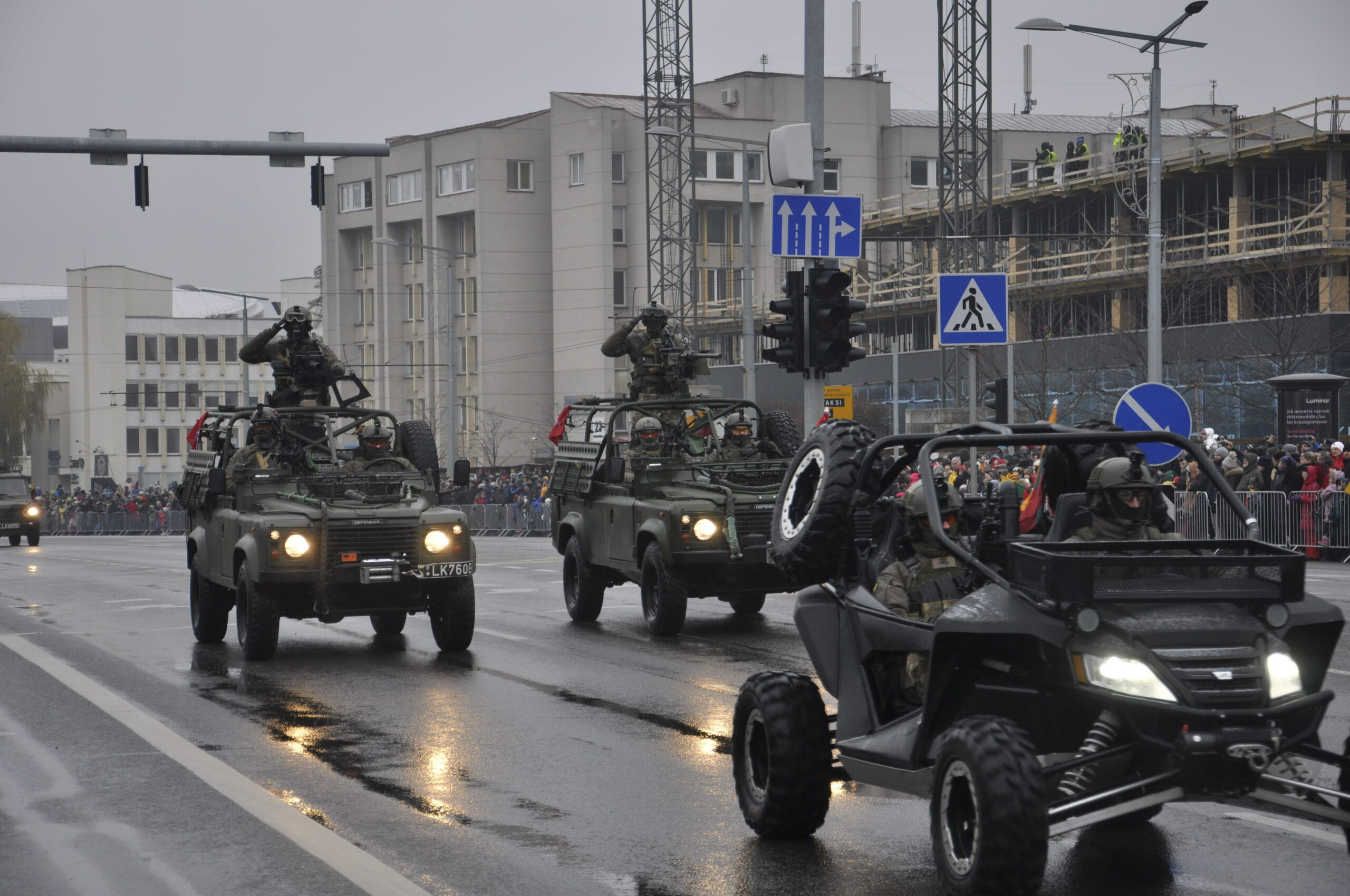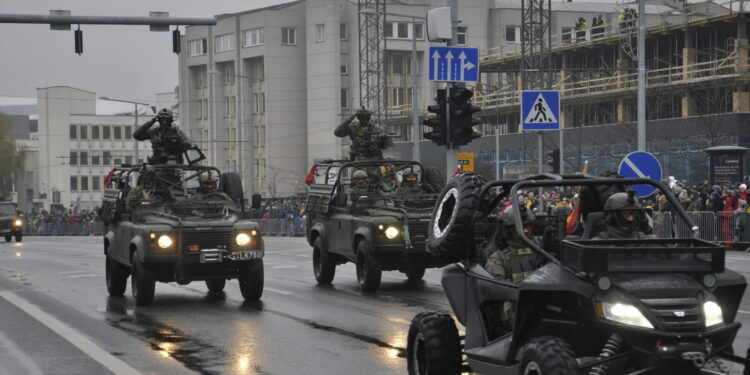Credit: Lithuanian Government
SB: What is your goal with this interview?
Kuročkina: When you are talking about the Lithuanian defence industry it’s not only about military capability, it’s about deterrence strategy and about the compatible economy as well. At the moment, in Lithuanian society, there are some tensions because people think that while we are strengthening our defence industrial capability, and attracting foreign investors such as Rheinmetall, we are preparing for war, and potentially we are increasing our attractiveness as a target. So right now we’re trying to send a message that no, it’s part of our deterrence strategy to have more foreign investors, foreign direct investment in Lithuanian defence. Having a strong local defence industry and investing in defence innovation are about a strong economy and about sending the message that we are ready.
SB: Are you extrapolating lessons learned from watching what is happening in Ukraine?
Kuročkina: Of course. The conflict in Ukraine shows us that warfare has changed. Now we have to be smarter, faster, more innovative on the battlefield, so we are trying to change direction and priorities. That applies to air defence, to our innovative solutions, lasers, optics, and all the niche competencies that we have. Basically, innovation will create advantage in the battlefield.
SB: One of the problems that has emerged in Ukraine, in the case of artillery, for example, is the ability to manufacture enough ammunition.
Kuročkina: Oh yes, that’s true. Ukraine has led to all the stockpiles being emptied, which is a huge problem, so that’s why Rheinmetall – even US companies – are trying to invest in identifying and capturing technical capabilities in Europe. So that’s why we decided to work with possible investors – and also we wanted to build the ammunition manufacturing capability, including in smaller calibres, because that’s very pressing.
SB: In terms of building this industrial capability, is that to be driven by developments within the country or does it require external investors and companies that are, or may already be, experts in optics, and CBRN, and so on?
Kuročkina: We’re thinking about the reintegration of local capabilities. Rheinmetall is coming with a huge investment, that’s true, but one of our requirements of Rheinmetall is the integration of our local defence and traditional manufacturing capabilities. We want not only to benefit our own defence and build our stockpiles; we want to drive the economy, and ensure that our businesses benefit from collaboration with the giants from a technological R&D side. That applies to the local workforce, and it will also drive exports. And just recently we launched an absolutely new law regarding the defence and security industry, so that bigger investors in Lithuania, which have contracts with our MoD, will also have to make contracts for local industry and maybe academia. It will be case by case – we will search together with the company or would-be investors, addressing what capabilities they will want to use from local companies, and collaboration with the universities. I’m also thinking about maybe a special programme for engineers, like a STEM initiative. Lithuania is famous for engineering: we have three big universities, which basically produce engineers, and we just met one company from France who noted that our engineering is better than theirs – that’s a direct quote! 20% of our GDP comes from traditional manufacturing. Lithuania’s market is highly diversified: we have everything, which is probably why we’re resistant to global pricing pressures, and why during COVID our economy was largely unaffected. And within two years we’ll be energy independent and most of our energy will come from local sources – including, I think, the biggest offshore wind farm in the Baltics.
SB: Does this Lithuanian initiative extend across to Latvia and Estonia as well, or is this purely at the moment Lithuanian?
Kuročkina: Purely Lithuanian.
SB: Is there a subsequent phase where it becomes a pan-Baltic initiative?
Kuročkina: All three MoDs have their plans, and therefore think about cooperation, but there’s no business case yet – at the moment we are working independently.
 Lithuanian Army vehicles participating in a parade marking the 100th anniversary of the re-establishment of the Lithuanian Army, in Vilnius, Lithuania, on 24 November 2018.
Lithuanian Army vehicles participating in a parade marking the 100th anniversary of the re-establishment of the Lithuanian Army, in Vilnius, Lithuania, on 24 November 2018.
Credit: US ANG/Maj Ellis Parks
SB: What about the bigger picture?
Kuročkina: One brand new thing is that Lithuania offers an extremely “green” corridor for defence companies. That’s green as in “fresh”, in terms of flexibility and availability of the Lithuanian market. What this means is that foreign defence companies have an opportunity to start numerous factories in Lithuania in six months. It means that we are helping them to, with almost no bureaucracy and no construction agreements or restrictions, to start building their facilities. These can be for individual projects, of national importance. For example, Rheinmetall will be the first to use the green corridor. We’re helping them to get through the bureaucracy, and we’ll help them to find the right location, because they have very specific requirements for land and resources. And of course, we’re helping them to search for the partners locally. We’re currently working on the industrial part, but we’ll also have some conversations about the workforce. Probably, naturally, they’ll start with their own workforce, but talking about project implementation, construction works and so on, everything will be covered from the Lithuanian side. And also, for live skills projects we offer tax exemption. For example, if the investment is bigger than 150 million Euros, then such a project can receive tax exemption of zero corporate tax for 20 years. It’s a very nice cherry! But I think flexibility and non-bureaucracy are also very attractive. For example, it is truly important for some German companies, and French companies, it’s really our speciality. Lithuania is a small country with a small market and it’s really hard to compete with Poland. Very hard. They have their own strong defence factories, they’re attractive to investors and have a big home market, but Lithuania is more open, its smaller size makes it easier to contend with the Polish defence industrial establishment – companies and politicians – so that’s a major advantage.
SB: Being relatively small implies a much greater degree of agility, and some big companies can be very cumbersome, difficult to penetrate, and quite difficult to work with.
Kuročkina: Yes, and I’m happy that a lot of other defence industry giants are quite active in Lithuania, and are searching for visibility. The message that we’re sending that you don’t need to be afraid of the defence industry: it’s a branch of the economy that helps to strengthen the country in various directions, including the economy, welfare, schools, education, R&D – as we mentioned in the beginning. Everything is very much interconnected. The main difference between the Ministry of the Economy and Innovation and the MoD, is that MoD is thinking about armed forces capability – that’s natural. From my side I want to say that it’s all a part of the economy, it’s all part of our security. So that’s my main message. The second message is about the niche competencies in Lithuania, and the prioritisation of more investment. Lithuania has the fastest growth in start-ups in the Central and Eastern European region, so for us it’s really interesting to work on that dual direction. These partnerships have enormous potential, remembering that during the First and Second World Wars, the Cold War, and the various arms races, basic technologies and technological advances came from the military. Later, of course, everything changed and defence and defence innovation spending, especially in European countries became catastrophically low. Now, however, from a technological point of view there’s strong demand for synergy across the military and defence industry and civil industry – and I feel that in Lithuania as well – so the prioritisation of technology sharing and development between civil and defence is inevitable. Geopolitics always plays a role, but in Lithuania we have thorough export controls, and we’ve never had a case of selling a product to a customer and then preventing them from using it: it’s not even part of the discussion.
Kirkilaite-Chetcuti: Historically, if you look at the European countries, the top 50 or 100 defence contractors emerged from specific technologies or programmes during wartime. Lithuania as a country doesn’t have that so we want to attract big names, especially from the USA. It’s quite an important step for us. They will come to our country, where there’s none of the competition that they would experience in Germany, Ukraine, Poland or Czechia. There may be similar products competing in the regional market, but if you have a foot on the ground in Europe, you are a European company, and European militaries look to buy European: our version of ‘Buy American’. And that would apply to other non-EU countries: Lithuania is a route into the EU market.
SB: Thank you both.
The interview was conducted by Stephen Barnard.
Source link : https://euro-sd.com/2024/09/articles/40220/zero-tax-for-20-years-lithuania-as-a-route-to-the-eu-market/
Author :
Publish date : 2024-09-06 07:00:00
Copyright for syndicated content belongs to the linked Source.


